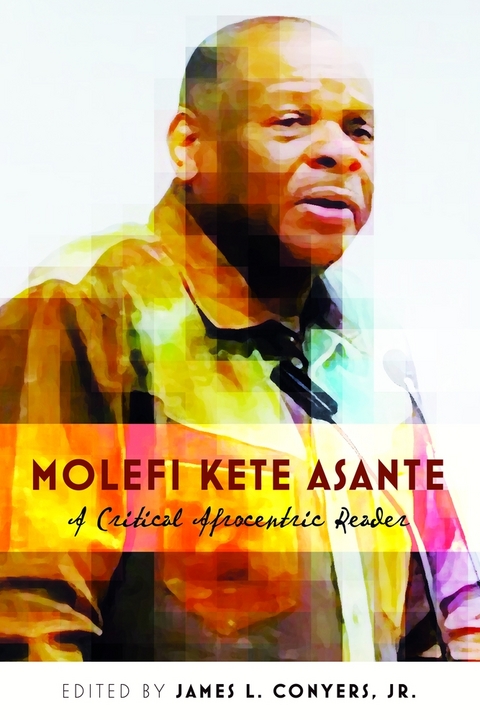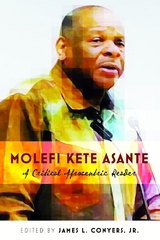Molefi Kete Asante
Peter Lang Publishing Inc (Verlag)
978-1-4331-1245-4 (ISBN)
Conceptually, Molefi Kete Asante: A Critical Afrocentric Reader is a reflexive analysis of the editor’s space in higher education over the past three decades. As a historical assessment, this reader is a narrative that offers a constructive perspective of Afrocentricity, as the sheer mention of the word draws reaction and fear from either uniformed or conventional personnel. The book organizes Asante’s writings into four categories: history, mythology, ethos, and motif. Arranged theoretically, these are the four concepts that describe and evaluate culture from an Afrocentric perspective. This study offers an assessment of Asante’s body of literature that continues to position the philosophy and ideals of the Afrocentric movement internationally. In the context of being a public intellectual, the core of Asante’s analysis draws inferences in locating Africana occurrences in place, space, and time. Advancing this idea further, the purpose of these presages is to motivate scholars in the field of Africana studies to contribute to the intellectual history of W. E. B. Du Bois, Maria Stewart, Carter G. Woodson, John Henrik Clarke, and the countless others who have advanced Africana research and writing. For many cynics and associates, the scholarship of Asante has not been thoroughly vetted. Directly or indirectly, Asante offers a foundation of optimism in forming the outliers of breakdown and breakthroughs for victorious thought of an Afrocentric perspective.
James L. Conyers, Jr., is Director of the African American Studies Program, Director of the Center for African American Culture, and University Professor of African American Studies at the University of Houston. He is the author or editor of thirty-five books and currently serves on the editorial boards of the Journal of Black Studies and the International Journal of Africana Studies. He is the founding editor of the serial Africana Studies: A Review of Social Science Research and editor of the book series Africana Studies. His most current publication is the edited volume Qualitative Methods in Africana Studies. His educational background includes a B.A. in communications from Ramapo College of New Jersey, a M.A. in Africana studies from the State University of New York at Albany, a Ph.D. in African American studies from Temple University, and graduate training in oral history at Columbia University.
Acknowledgements – Introduction – History – Mythology – Motif – Ethos – Reflection Essays – Conclusion – Index.
“This important collection has great potential for mitigating the widespread misunderstanding of the construct of ‘Afrocentricity,’ as advanced by Molefi Kete Asante. Much of the criticism leveled at Asante fails to understand, as he appropriately reminds readers, that Afrocentricity is articulated as ‘the ideological centerpiece of human regeneration, systematizing our history and experience with our own culture at the core of existence.’ Building on intellectual insights of Cheikh Anta Diop, Asante has not only weathered the heavy criticism, he has produced a remarkable volume of scholarship that explicates and extends his initial formulations. The selections in this volume provide readers, and especially serious students of Africana Studies, with a unique opportunity to follow the trajectory of Asante’s intellectual explorations, and also to better understand the ideology and values that catalyzed the formation of the discipline.”
James B. Stewart, Professor Emeritus, Penn State University
“Molefi Kete Asante, the founding theorist of Afrocentricity, is one of the pre-eminent, independent thinkers and theorists of our times. His wide body of work has influenced and helped shape dialog and discourse in the academy and society and affirms his vital and enduring place in the intellectual history of African people. This collection of Professor Asante’s essays with reflections by his former students is an added and important contribution to engaging and appreciating the scholar and his transformative intellectual initiative and achievement.”
Maulana Karenga, Professor and Chair, Department of Africana Studies, California State University, Long Beach
“This is a significant volume focusing upon the work of a great intellectual who has contributed so much to scholarship in American higher education. It is a must-read for all who would seek to be enlightened by one of the major works in Africana studies.”
Delores P. Aldridge, Grace Towns Hamilton Distinguished Professor Emerita of Sociology and African American Studies and Founding Director of African American and African Studies (1971–1990), Emory University
| Erscheinungsdatum | 01.06.2017 |
|---|---|
| Reihe/Serie | Black Studies and Critical Thinking ; 15 |
| Mitarbeit |
Herausgeber (Serie): Rochelle Brock |
| Verlagsort | New York |
| Sprache | englisch |
| Maße | 150 x 225 mm |
| Gewicht | 370 g |
| Themenwelt | Sozialwissenschaften ► Ethnologie ► Völkerkunde (Naturvölker) |
| Sozialwissenschaften ► Pädagogik | |
| Sozialwissenschaften ► Soziologie | |
| ISBN-10 | 1-4331-1245-0 / 1433112450 |
| ISBN-13 | 978-1-4331-1245-4 / 9781433112454 |
| Zustand | Neuware |
| Informationen gemäß Produktsicherheitsverordnung (GPSR) | |
| Haben Sie eine Frage zum Produkt? |
aus dem Bereich




